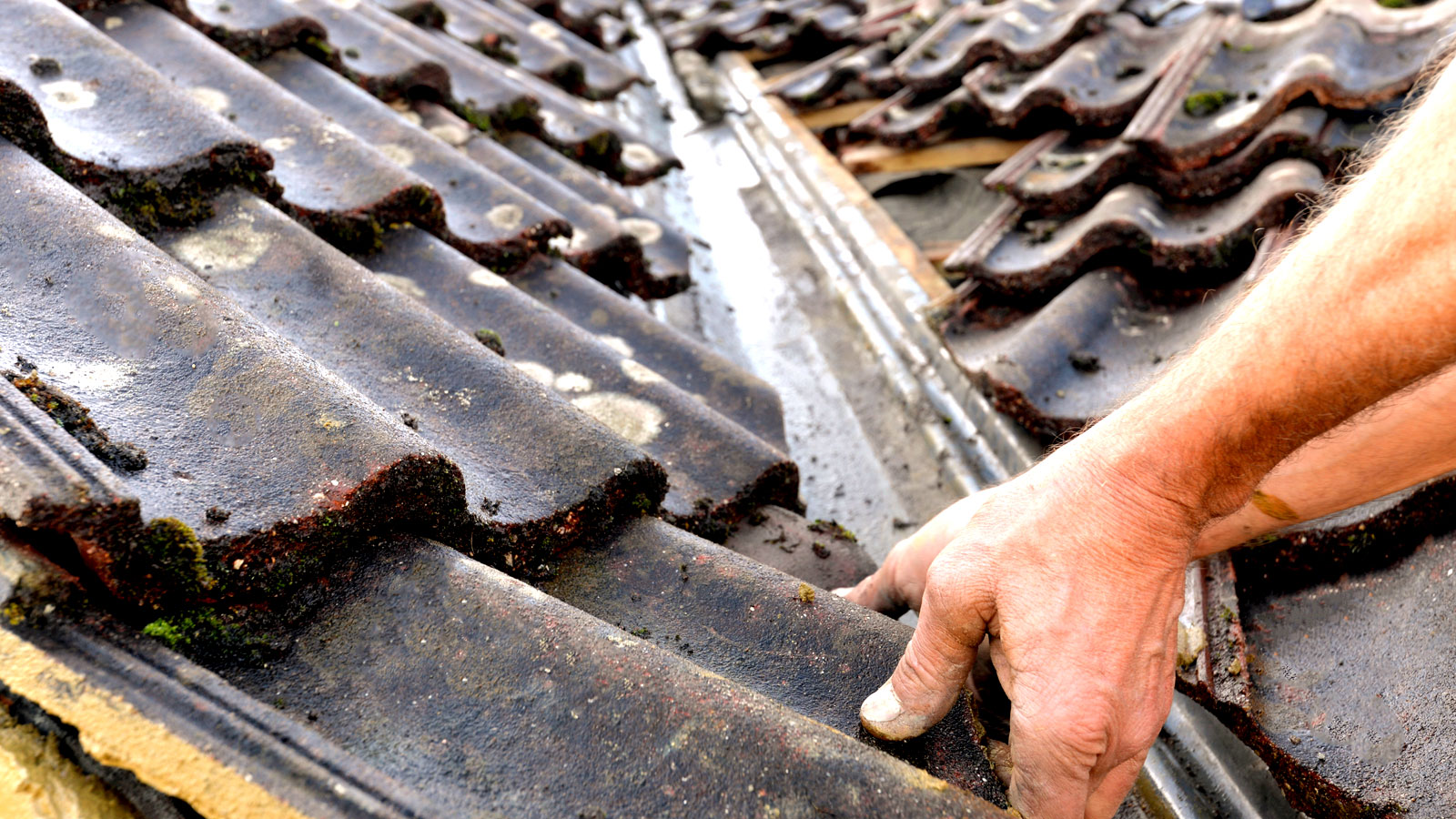Roof leak repair costs: What you should expect to pay to keep wet weather out
Discover the factors that can determine roof leak repair costs, what you can expect to pay and whether or not you can claim on your insurance

Roof leak repair costs are not easy to determine. If you have a cracked or missing tile, or a pinhole in your flashing, costs are going to be low. But if you need a full scale replacement of tiles, flashing or guttering you should expect the cost to rise significantly.
Repairs may need more than one person, scaffolding may be needed, and specialist tiles can all add to the cost. So make sure to get quotes from plenty of local roofers or builders. Then you might want to weigh up the repair costs against how much a new roof costs, before deciding whether you should repair or renew.
Roof leak repair costs: Factors affecting cost
1. Type of issue
Simpler jobs typically cost less to repair than bigger issues. Replacing tiles and gutters are straightforward jobs and commonly take less time to sort. But if leadwork or flashing needs attention this is a longer job and will push up the price.
2. Extent of damage
The more damage the more a repair will cost. For example, a pinhole in the flashing may be letting in small amounts of water and is typically a quick and less expensive fix. But if the flashing needs replacing the cost will obviously be more.
3. Roof style
Do you have a pitched roof or a flat roof? Both types of roof involve different finishing, i.e tiles and bitumen, so the costs will vary on the type.
4. Cost of materials
Different roof repairs will need different materials. Do you need new flashing? Do you need new guttering? Are you repointing a chimney? Do tiles need replacing? For example, lead flashing comes in different codes (basically the thickness), with 6m of code 3 flashing costing around £30-£50 compared with 6m of code 6 flashing, which will be around three times the price. And the same applies to tiles – concrete and clay tiles are much cheaper than natural slate tiles.
5. Extra equipment
Access to a roof may be limited or the repair job cannot be done with just a ladder. There may be the need to introduce scaffolding to perform the roof repairs. The cost will depend on what scaffolding is needed and how long for, But expect it to add around at least £300-£500 for a week.
How much does it cost to fix a leaking roof?
This depends very much on what is causing the leak, the extent of the damage that it has caused and what type of roof you have. Simpler problems such as a cracked tile or two can be done by a competent DIYer. But you will need a head for heights and the necessary equipment for both safety and doing the job itself.
But if the problem is beyond your remit or you need roof replacement costs you will need to call in a professional, which will add to the overall cost as Turrou Landesmann, trading manager at Roofing Superstore reveals, “The costs of repairs vary depending on the roof type, the material it’s made from and the size of the area that needs to be fixed. As a rough estimate, the average repair cost of a flat roof in the UK is £100 per m2. The equivalent for pitched roofs made from clay, concrete or slate ranges from £140- £180m2.
He continues, “That may sound like quite a bit, but it’s nothing compared to felt roofs – if you have one of those, you’ll have to part with as much as £1,245-£1,465 per m2.”
It is worth remembering that roof repair jobs can be very different so it makes sense to get at least three quotes from local trades to get a good indicator of what you can expect to pay.

Turrou is the Trading Manager at Roofing Superstore, a company that was launched in 2009 as an online supplier offering a vast range of roofing supplies, online help and advice and knowledgeable customer service.
How much do roofers charge per day?
As a general guideline roofers will charge around £200 per day, but this will vary depending on where you are in the UK. Note this will be for one person, so if the job requires two or even three people on the job, the daily rate can double or triple.
For smaller jobs a roofer can charge by the metre depending on the size of the job, by the hour (typically £30-£40 plus a call out charge) or will give you a quote for the whole job.
What are the signs that a roof is leaking?
“The first indication of a leaking roof is usually an area of mould, dampness or discoloration that appears on the inside of your home, particularly in loft spaces“, explains Landesmann, but identifying where a roof is leaking is not always easy. “Pinpointing exactly where the leak is can be challenging as water doesn’t always travel in a straight direction once inside a pitched roof”.
He continues, “The most common causes of leaks are a damaged chimney, incorrectly installed or worn-out flashings, clogged gutters, missing shingles or tiles, and holes in the membrane. Other things that might cause roof leaks are roof vents and damaged or loose flashings around skylights.”
But he advises that it's best to keep an eye on your roof even if there aren't any current problems. “It’s important to check your roof not only when you think it’s leaking but periodically to make sure it’s in a good state of repair. Many of these checks can be done at ground level but care should always be taken if you’re planning to access the roof itself.”
What can happen if I leave a roof leak?
“Leaks, if not dealt with as soon as possible, can lead to different issues that are both structural and health hazards,” reveals Landesmann. “Rotting of roof rafters can lead to a weakening of the structure and, if left too long, can be a costly and difficult fix.”
Outside some of the more serious problems, leaks in a roof can lead to internal issues such as dampness. The extra moisture can cause damage in walls and ceiling and lead to the growth of mould, which can be expensive to fix and can lead to health issues if not dealt with.
FAQs
Can I fix a leak myself?
Yes you can if it's a small job and you have some previous DIY experience with roofs. But even then you will need to get up a ladder or scaffold, so you will need a head for heights.
Ideally you should call in a professional to give their expert opinion on what the issue is and get them to provide a solution and a quote for the work.
Can I claim for a leaking roof on insurance?
“Storm damage to a roof – including the roof tiles – is typically covered by building insurance, ” explains Landesmann. “However, this will depend on the provider. So, you must check your policy documents or with the provider to confirm your coverage options.”
The insurance company will likely want to see any evidence that the roof has been well maintained when you are seeking compensation. If you do have any work done to your roof make sure to keep any receipts to prove work has been done.
If your home/buildings insurance doesn’t cover your roof, think about getting a quote from an insurer that does cover roof repairs.
If you're getting your roof fixed you might want to try something more eco friendly than standard tiles. Read about solar roof tiles and the benefits they can bring.
Get the Homebuilding & Renovating Newsletter
Bring your dream home to life with expert advice, how to guides and design inspiration. Sign up for our newsletter and get two free tickets to a Homebuilding & Renovating Show near you.
Steve Jenkins is a freelance content creator with over two decades of experience working in digital and print and was previously the DIY content editor for Homebuilding & Renovating.
He is a keen DIYer with over 20 years of experience in transforming and renovating the many homes he has lived in. He specialises in painting and decorating, but has a wide range of skills gleaned from working in the building trade for around 10 years and spending time at night school learning how to plaster and plumb.
He has fitted kitchens, tiled bathrooms and kitchens, laid many floors, built partition walls, plastered walls, plumbed in bathrooms, worked on loft conversions and much more. And when he's not sure how to tackle a DIY project he has a wide network of friends – including plumbers, gas engineers, tilers, carpenters, painters and decorators, electricians and builders – in the trade to call upon.

